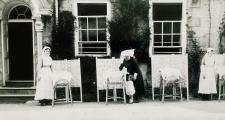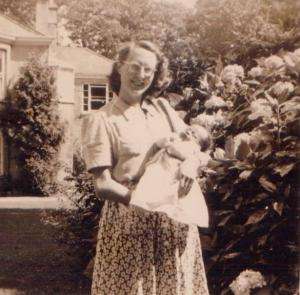Why my mother and other persecuted unmarried mums deserve an apology

The recent resignation of the Archbishop of Canterbury over the Church of England’s cover-up of sexual abuse inflicted on young people by a senior clergyman has highlighted how as an organisation it suppressed its actions.
The focus has been on the abuse of power in regard to children, but there is another set of victims who are still largely hidden from public scrutiny. For the Church also turned a blind eye to the appalling abuse inflicted on women in the unmarried mothers’ refuges it sponsored until the 1970s.
The mass media’s focus to date has been on Ireland’s Magdalene Laundry homes for unmarried mothers and women accused of falling short of the strictures of the country’s Catholic theocracy.
In the introduction to the latest edition of my childhood memoir, The Golly in the Cupboard, I point out that the first Magdalene Laundry was established by Protestants in London’s Whitechapel district in 1758*.
The faith would go on to spawn hundreds of such homes, many sponsored by the Church of England, and with conditions just as harrowing for the women who sought sanctuary within them.
My mother, Mavis Frampton, a teacher, was one of hundreds of thousands of women whose lives were brutally scarred simply because they gave birth out of wedlock in the postwar years. To hide my birth, she was forced to seek refuge in the Rosemundy Home for Unmarried Mothers in the Cornish town of St Agnes, hundreds of miles away from where she taught.
Evidence has consistently been put before parliament of how unmarried mothers in those years faced harrowing abuse, degrading treatment, denial of anaesthetics when giving birth, unknowingly being drugged so they could not lactate and cynical actions designed to force them to surrender their newborn to the adoption market.
In 2023, a UK parliamentary inquiry largely accepted these findings and called on the UK government to issue a full public apology to those impacted and to institute various restorative measures. The outgoing Conservative government declined.
Now Labour is in office and organisations such as the Movement for Adoption Apology are calling for the implementation of the parliamentary inquiry’s recommendations.
In my mother’s case, she also faced the racist actions of the government.
My father was Black and from Nigeria which was a British colony at the time. He was removed from the UK for the crime of dating my mother.
Abortion was illegal until 1968, so pregnant, unmarried mothers either had to get a married relative to assume parentship and claim a home birth to hide away from public scrutiny, or seek sanctuary in a home for unmarried mums.
Those homes commonly inflicted appalling psychological and physical misery upon the mothers. Their demand for mothers to give up their babies intensified over time in order to meet the demands of the adoption market.
None of this behaviour was legally endorsed but, despite it being in full view of the establishment, neither was it prevented. The state and its religious arm, the Church of England, appeared content to allow these cruel habits, which in the case of forced adoptions ensured the state did not have to spend money on unmarried mums bringing up their children. Instead, their children were handed over to more financially endowed families.
The climate presided over by the government generated a glut of long-term misery for the mothers, their families and their ‘illegitimate’ children. The many mothers who succumbed to pressure to abandon their newborn were left with a lifetime of guilt, with all the associated mental and physical harm.
The abandoned new born not only suffered the trauma of separation, but also the lifelong sense of individually inexplicable abandonment. The mothers who hid their baby’s birth from public view and passed parental responsibility onto others felt forced to spin such a web of deceit that it engulfed families in a lifetime of distrust.

Unmarried mothers were barred from teaching, so, to retain her job, my mother was forced to hide her pregnancy, her motherhood and her child, not only from the teaching profession but also her closest friends and even her own mother.
Her other children and most of her friends would not learn of my existence till 20 years after her untimely death.
In turn, I, the shameful secret, was left to grow up in orphanages, totally unaware of her existence till the moment that, at 14 years of age, I was informed that she was dead.
Equally, my father, returned to Nigeria, and despite being informed of my existence, felt compelled to keep me a secret from his Nigerian family and children.
Last April, I was invited by St Agnes Museum to address a public meeting on the subject of my being born at Rosemundy. Some 1,200 mothers passed through Rosemundy during the half century it was open. The Facebook page I set up in 2011 for its survivors and relatives has 700 people from around the world in contact… and this just for one home.
Among the 80 people attending the public meeting were mothers and adoptees who had also passed through Rosemundy. Their harrowing stories led to plans to erect a plaque or small monument to the Rosemundy mothers and babies. However, for healing to begin, much more has to be done.
Many ask why a public apology is demanded by the mothers. If they heard the trauma of these mothers’ treatment and the lifelong guilt for succumbing to pressure to surrender their child, the doubters might understand the importance of a big government statement absolving the mothers from “blame” both in their eyes and that of the children they “gave away”.
How does a mother explain to her adult child that she felt she had no option but to give that person to someone else to raise? How will that alone satisfy a person riddled with questions as to their worthiness?
Then there is the question of why, when the Australian government made a similar apology more than a decade ago, is the UK government so reluctant? You will find the answer in the role that the Church of England played but also the demands for restorative measures to offset some of the injustices.
Measures such as counselling and assisting with the cost of relative searches, which could be considerable given those effected may rise into the millions.
The cost to mental health services and to society as a whole of ongoing unaddressed trauma for the mothers, the abandoned children and their relatives is immense. It is a case of acknowledging past failures and investing in a better healthier future.
Dr Phil Frampton is author of The Golly in the Cupboard and presenter of The Crying Shame, a documentary on the Rosemundy Home for Unmarried Mothers
*Author Frances Finnegan records how the first Magdalene ‘asylum’ Laundry was established by Protestants in London's Whitechapel district in 1758 and these practices would reach Ireland only a decade later
BASW blog: Speaking out – as social workers, let’s ensure we take responsibility for breaking the silence
